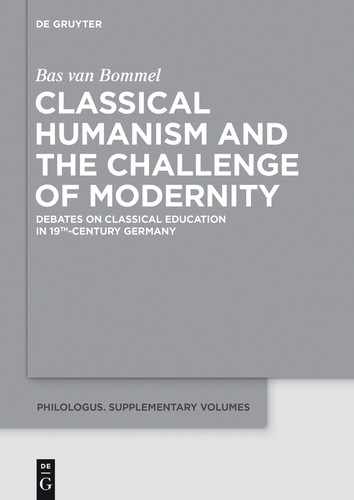Preface
The desire to write this book arose out of my teaching. About thirteen years ago, I decided to study Classics at the University of Amsterdam because I was deeply in love with the ancient Greeks and Romans. Having read worrying amounts of Romantic German literature in my adolescent years, I strongly sensed that the classical world was permeated by a kind of mysterious spirit that infused its cultural expressions with a nearly sacred aura. For a long time, it was the most normal thing in the world to me to look upon classical antiquity as a singularly blessed epoch of rare significance and beauty. My unbridled enthusiasm was only challenged when some ten years ago – by a complete coincidence – I started teaching. From one moment to another I saw myself face to face with a class of thirteen-year old boys and girls who exhibited a disturbing but fascinating indifference to everything that mattered to me. Although they were certainly willing to learn, their minds were not in any way predisposed towards the subject that I was so enthusiastic about. If I was to inspire them at all, I had to begin from scratch. Thus, I made the fundamental realisation – obvious but often forgotten – that the survival of what we call ‘the classical heritage’ is almost entirely dependent on education, and therefore anything but self-evident.
Through this confrontational experience I became interested in the complex relationship between classical education and modern society. Why do we still teach the classics at the beginning of the 21st century? What is their meaning? Their use? Their value? I soon realised that these arresting questions can only be addressed in a meaningful and constructive way by tracing them back to their historical roots in the late 18th and early 19th centuries, that is, to a time when classical education first came into conflict with the changing needs of modern society. The present book is the result of this intellectual enterprise, to which I have gratefully dedicated myself over the past five years.
I would like to express my gratitude to a number of people without whom writing this book would not have been the satisfying and enriching experience that it was. Firstly, I want to thank my dear friend and colleague, professor Jeroen A.E. Bons. Although for personal reasons he was not in the position of reading a single draft, his spirit closely accompanied me over the past five years. My understanding of classical humanism has not only greatly improved from studying historical sources but also from knowing a scholar whom I regard as its true embodiment. For his unique abilities as a teacher and his deeply humane character he has been an example to me for many years. It is to him that I therefore gratefully dedicate this book. Secondly, I want to thank Mrs. Uta Rie-merschmid-von Rheinbaben, who four years ago kindly took the risk of accommodating me in her wonderful Munich house. It is thanks to her that my research stays did not turn into monotonous, lonesome occasions – which research stays often do – but into salutary experiences marked by quietude, devoted work and friendship. Rarely have I felt nearer to Heaven than when I headed for the Bavarian State Library on frosty winter mornings, looking forward to long days of undisturbed reading while reflecting on our thoughtful breakfast conversations.
Thirdly, I am grateful to professor Josine Blok and professor Paul Ziche, who supervised the doctoral thesis on which the present book is based. Not only have I learnt much from their many acute and elucidating criticisms, but above all, I thank them for allowing me the freedom to conduct my research in the way I deemed appropriate. I would by no means have succeeded in writing this book had they not kindly given expression to that most endangered of academic virtues: trust. Fourthly, I want to thank professor Rolf Selbmann from the Ludwig-Maximilians-Universität München, with whom I have informally discussed all subsequent chapters of this book in the exhilarating surroundings of Bavarian pubs. It has been very inspiring to regulary engage in conversation with a scholar endowed with the rare combination of massive erudition, great common sense and infectious humour. Fifthly, I thank my father Niek van Bommel for purifying my book of numerous small inaccuracies. The meticulousness and patience with which he has performed this task is truly astounding and has contributed substantially to this book’s professional appearance.
With all my heart I finally thank my beloved wife Sjaan Oomen. The past five years would not have been such a rewarding and deeply enriching time if I had not spent them in her radiant and comforting presence. My marriage to her I genuinely consider the greatest blessing of my life.
Utrecht, May 2014
